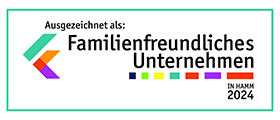Use advisory services

Laura Wolf
Representative of Students with Disabilities or Chronic Diseases
Students with disabilities are an extremely heterogeneous group. Most disabilities are not apparent during everyday student life. Unless they point out their impairments themselves, such students will frequently go unnoticed at the University of Applied Sciences. This has consequences: Many people do not know that they have special legal rights (e.g., entitlement to disadvantage compensation) and do not feel that their needs are addressed by the existing consultation offers.
Studies and disabilities
-
1. Studying with disabilities – Do I belong in this category?
Statutory legislation defines who belongs in the category of students with disabilities and chronic illnesses. According to the UN Convention on the Rights of Persons with Disabilities (CRPD), "Persons with disabilities include those who have long-term physical, mental, intellectual or sensory impairments which in interaction with various barriers may hinder their full and effective participation in society on an equal basis with others." (Article 1, Sentence 2).
They may suffer from:
- Impairments in mobility, motor skills, hearing, sight or speech
- Mental illnesses (like depression or anxiety disorders)
- Chronic-somatic illnesses (like multiple sclerosis, epilepsy or chronic intestinal diseases)
- Partial performance disorders (like dyslexia or ADHD)
-
2. Information for prospective students
Students with disabilities or chronic illness often face special challenges in their day-to-day studies. Before starting your studies, you may have very specific questions. Sometimes certain students also need extra support during their studies. That is why we recommend taking advantage of the advisory services offered by the University of Applied Sciences and informing yourself about support opportunities well before your studies begin.
Application and admission
During the application process, study applicants with disabilities can submit a special application for admission. Consideration is given to:
- Applications filed on the grounds of exceptional hardship (hardship application)
- Applications for disadvantage compensation for an improved average grade
- Applications for disadvantage compensation for a waiting period bonus
In study programs with unrestricted admission, such a special application is irrelevant because all applicants are admitted (as long as they hold a university entrance qualification). This situation is different in study programs with restricted admission where, due to high demand, there are more applicants than available places (called numerus clausus or NC procedures). For general information on hardship applications or disadvantage compensation for the admission procedure, click here.
Important
A hardship application or disadvantage compensation during the admission procedure can only be submitted by an individual who fulfills the general admission requirements. Even prospective students with a disability or chronic illness must also always first prove their university entrance qualification (as a rule by holding a general higher education entrance qualification, subject-related university qualification or qualification for a university of applied sciences or a professional qualification).
Before you submit a special application, you should critically review whether this application has a chance for success. Many study applicants set high hopes for their special applications. In this regard, the universities uphold strict standards. Not every reason that may appear personally relevant can be recognized as a "special case" when allocating places in the study program.
-
3. Disadvantage compensation in examinations
Students with disabilities have a legal right to be afforded equal opportunity to study at a university. Disadvantage compensation is an instrument to compensate for individual disadvantages.
Many students are unable to take examinations in the prescribed manner due to health or physical impairment. They often need changes made to chronological and/or formal conditions. Disadvantage compensation does not mean the examinations are made easier; rather, the aim is to minimize existing disadvantages. Disadvantage compensation is always aligned to the specific case and the respective type of examination. Examples include:
- Extending the time prescribed to take tests and write papers
- Taking the examination in a separate room
- Allowing a recovery break during examinations
- Replacing written with oral examinations (and vice versa)
In principle, disadvantage compensations can apply to all ways of earning credits, particularly to exams, oral reports, presentations, orals, term papers, reports and theses.
It is important to note that there are performance-based limits to disadvantage compensation: In principle, students must be able to acquire the competencies required in their degree program and demonstrate this knowledge through examinations. In specific terms, this means that the framework conditions of an examination can be modified, but not the achievement objectives per se. In principle, these must be fulfilled by all students.
Do you have questions concerning application submission? Do you need support or are you unsure whether you should apply for disadvantage compensation? Then contact the Students with Disabilities Representative. She will be happy to help you along the way.
For more detailed information on disadvantage compensation, visit the website of the German National Association for Student Affairs (Deutsches Studentenwerk, DSW).
-
4. Student loans
The main form of student funding is the German federal government’s student grant and loan program called the Federal Training Assistance Act (BAföG). Under BAföG legislation, special regulations are in place to compensate for disadvantages specifically caused by disabilities. These special regulations stipulate aspects like age limit, duration of funding, the offsetting of income and assets, etc. For more information, visit the website of the Student Services Organization "Studierendenwerk Paderborn".
Besides financial aid through BAföG, there are several foundations that offer special funding programs for students with health or physical impairments. You will find an overview here.
-
5. Studies-related additional expenses due to health or physical impairment
Sometimes, students with disabilities require additional financial support. These studies-related additional needs include all studies-related, customized assistive technology devices, communication and study assistive technology, mobility aids and additional material and support benefits required by reason of the disability in order to enable the students to pursue their studies independently and equitably. Entitlement to integration assistance pursuant to the German Social Code (SGB IX) can be applied to fund these studies-related additional costs.
If you study at HSHL, you must submit your application for integration assistance to the regional authority (Landschaftsverband Westfalen-Lippe, LWL). Your representative of students with a disability will help you fill out the application.
-
6. Barrier-free accessibility
HSHL strives to provide barrier-free accessibility to all university buildings and rooms. Visually and mobility-impaired students should become acquainted with the walkways, streets and geographical circumstances early on. If problems relating to barrier-free accessibility occur as part of everyday student routine, please report these to the representative so that she can help remedy the situation.






